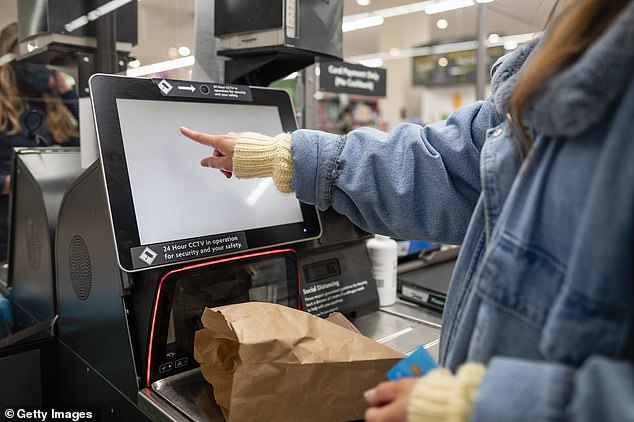More than a third of Brits openly admit to using self-service checkouts to steal from shops – amid concerns ‘middle-class shoplifters’ are adding fuel to the fire of Britain’s store theft crisis.
A poll of 1,000 British shoppers conducted for The Grocer magazine has found that 37 per cent of customers deliberately failed to scan an item when using self-service checkouts – with men and the under-35s most likely to do so.
But 32.5 per cent also admitted not weighing loose items correctly – while 38 per cent had employed the ‘banana trick’ to pass off an expensive item as a cheaper one, such as weighing electronics as fruit to fool the machine.
Criminology experts say self-service machines have created a ‘new breed of shoplifter’ that are stealing at times they otherwise wouldn’t.
And retail chiefs are concerned that self-service tills are driving up costs by creating opportunities that aren’t there under the eyes of a watchful checkout operator.
It comes amid fears that Britain’s shoplifting epidemic is ‘spiralling out of control’ -an alarming claim from the British Retail Consortium.
It released figures last week suggesting 20million shoplifting incidents were reported in the 2023/24 financial year – 55,000 a day – costing shops £2.2billion despite spending £1.8billion on prevention measures such as CCTV and anti-theft devices.
Helen Dickinson, chief executive of the BRC, said criminals were becoming ‘bolder and more aggressive’ while retailers had ‘little faith’ in police attending in time.
Are you a self-scan shoplifter? Email in confidence: jon.brady@mailonline.co.uk

More than a third of Brits have admitted using self-service machines to steal from stores – either by passing off expensive items as cheaper ones or by not scanning them at all

A survey for The Grocer magazine revealed nearly two in five confessed to ‘failing to scan’ an item (pictured: file photo of Tesco self-service checkouts)
But retailers don’t just fear being ransacked by masked thugs who openly pilfer from shelves, seemingly without consequence, as helpless staff stand by and watch for fear of being hurt if they intervene.
There is also the new wave of ‘middle-class shoplifters’, seemingly entitled and emboldened to steal as they see fit – with the trusty self-service checkout recruited as an unwilling accomplice.
Matt Hopkins, an associate professor in criminology at the University of Leicester, told The Grocer: ‘This move to self-scan and self-checkout, has created a new breed of shoplifter.
‘You’re creating opportunities for people who otherwise wouldn’t even think about shoplifting.’
Archie Norman, chairman of Marks & Spencer, has previously openly blamed ‘middle-class’ shoplifters for exploiting self-service tills to steal.
He believes the occasional frustrations that come with tills – such as the infamous ‘unexpected item in the bagging area’ – prompt some less-than-honest shoppers to simply deal with their frustration by telling themselves it’s okay to steal.
Speaking to The Telegraph in 2023, he said: ‘It’s too easy to say it’s a cost of living problem. Some of this shoplifting is gangs. Then you get the middle class.
‘With the reduction of service you get in a lot of shops, a lot of people think: “This didn’t scan properly, or it’s very difficult to scan these things through and I shop here all the time. It’s not my fault, I’m owed it”.’
Supermarkets have shelled out millions on self-service tills in a bid to cut costs – with M&S commencing a trial of them in its clothing sections at the end of last year.
Unlike typical self-scan checkouts, which require shoppers to scan items one by one, the new M&S clothing tills use RFID (radio-frequency identification) chips to identify clothing dropped into the unit’s ‘basket’.
Similar tech is used by brands such as Uniqlo and Zara – with the tills thought to ‘kill’ RFID tags after the items have been scanned and paid for so shoppers don’t set off alarms after purchasing.

The rise in shoplifting has come despite huge investments by retailers in security measures such as body-worn cameras (pictured: A Co-op worker’s bodycam)

Self-service checkouts are a ubiquitous sight in British supermarkets – and are rolling out to more stores (pictured: Waitrose tills)

But there are concerns that frustrated shoppers are occasionally helping themselves to items when the tills fail to work properly

Some supermarkets, such as Asda, have committed to putting more staff on tills (pictured: Asda self-service checkouts)
Reports suggest it expedited plans to roll out more self-checkouts after Rachel Reeves’ Autumn Budget in order to cap its National Insurance bill in the face of increased employer contributions from this April.
However, amid a perceived customer backlash, some have reintroduced staff on manned tills or even scrapped the self-checkouts altogether.
Northern supermarket chain Booths scrapped almost all of its self-service tills in 2023 amid negative feedback, while Asda announced last August it was spending £30million on extra staffing hours for checkouts.
Morrisons chief executive Rami Baitiéh, meanwhile, admitted around the same time that it had gone ‘a bit too far’ in rolling out self-scanning.
However, The Grocer’s research also revealed that, contrary to established wisdom, Brits actually prefer using self-service machines to manned tills – 54 per cent versus just under 30 per cent who prefer old-fashioned service.
Sainsbury’s boss Simon Roberts said in April that most customers like them because of their speed – despite grumblings about receipt-scanning security gates meant to deter shoplifting.
The under-35s are most likely to prefer self-checkouts, with seven in 10 choosing them over staffed tills. A MailOnline poll in 2023 found four in five readers prefer the human touch.
In recent days, we have reported extensively on the threat posed by middle-class shoplifters – particularly to small, independent businesses unable to afford the kind of en masse security measures employed by the big supermarkets.
In Surrey, gift shop owner Lindsey Kleinlercher said ‘blatant and brazen’ thievery was taking place at the hands of ‘very normal well-to-do people (who) don’t look like your normal thief’.
Inge Dunbar, who owns a gift shop in Haslemere, told us: ‘What we get most often is actually well-off middle-aged women.’

Not every shoplifter tries to exploit the self-scan. Some are more brazen, including this masked thief loading stolen vapes in to a large bag in a Tesco store

MailOnline recently obtained footage from shop owners in Surrey that shows how they have also been hit by Britain’s shoplifting crisis. In this grab, a member of staff confronts a shoplifter in Haslemere
The businesswoman says people have stolen clothes, jewellery and upmarket Jellycat soft toys.
‘If someone’s stealing bread, of course you feel sympathy because they’re struggling,’ she told MailOnline.
‘But when they’re stealing in a shop like this? That’s not to do with the cost of living crisis.’
Richard Fowler, who manages security at upmarket health food brand Planet Organic, said shoplifting at his Chiswick, west London branch takes place ‘every day’ – and that ‘posh totty’ types are part of the problem.
He previously claimed the brand loses a staggering £900,000 a year as a result of stealing. The chain has nine stores across London.
Speaking to the BBC, Mr Fowler said: ‘We’ve got our homeless… Then we have what I would call the posh totty people.
‘They shop in Planet Organic on a daily basis, they spend a lot of money with our business.
‘[They think]… “today I’m a little bit short of money, so I’m entitled to steal something”.’
And many of these shoplifters have flocked to a support forum launched by the Consumer Action Group – where well-to-do thieves worry about whether they can still shop at Waitrose after being caught nabbing wares from sister shop John Lewis.









